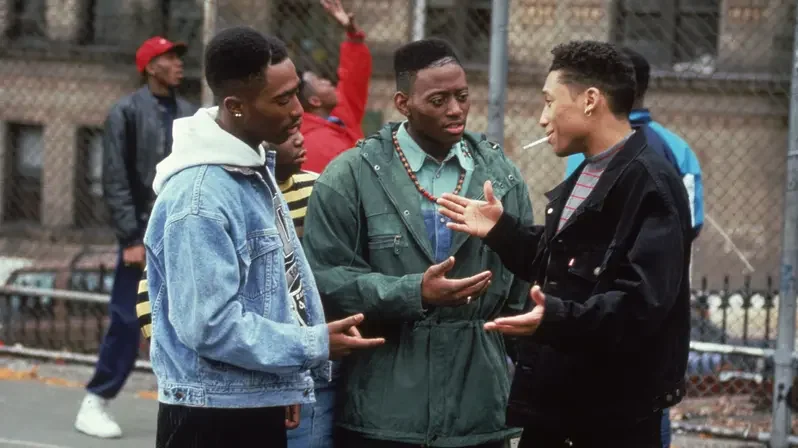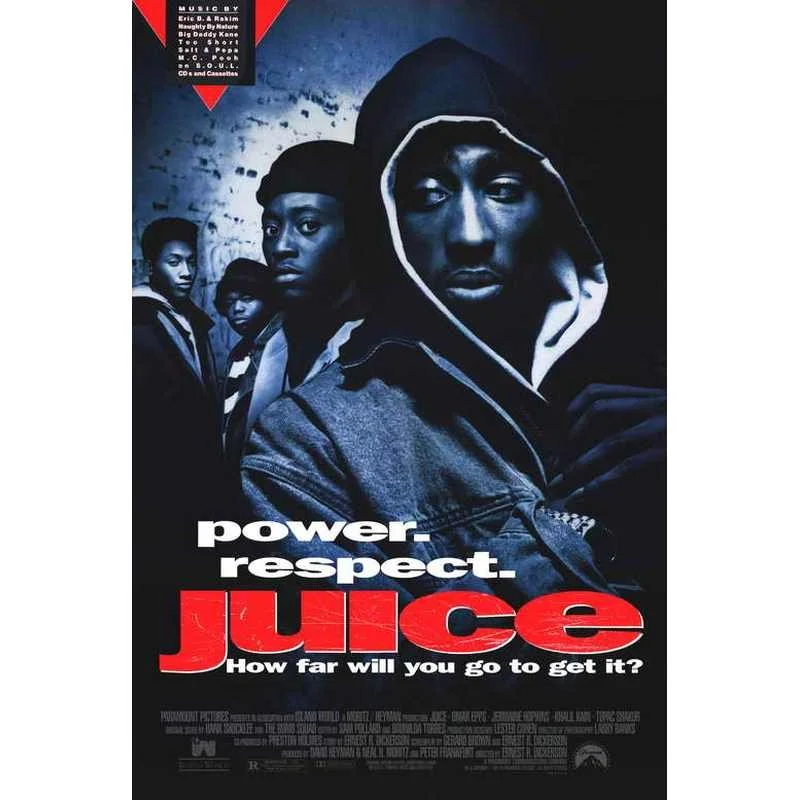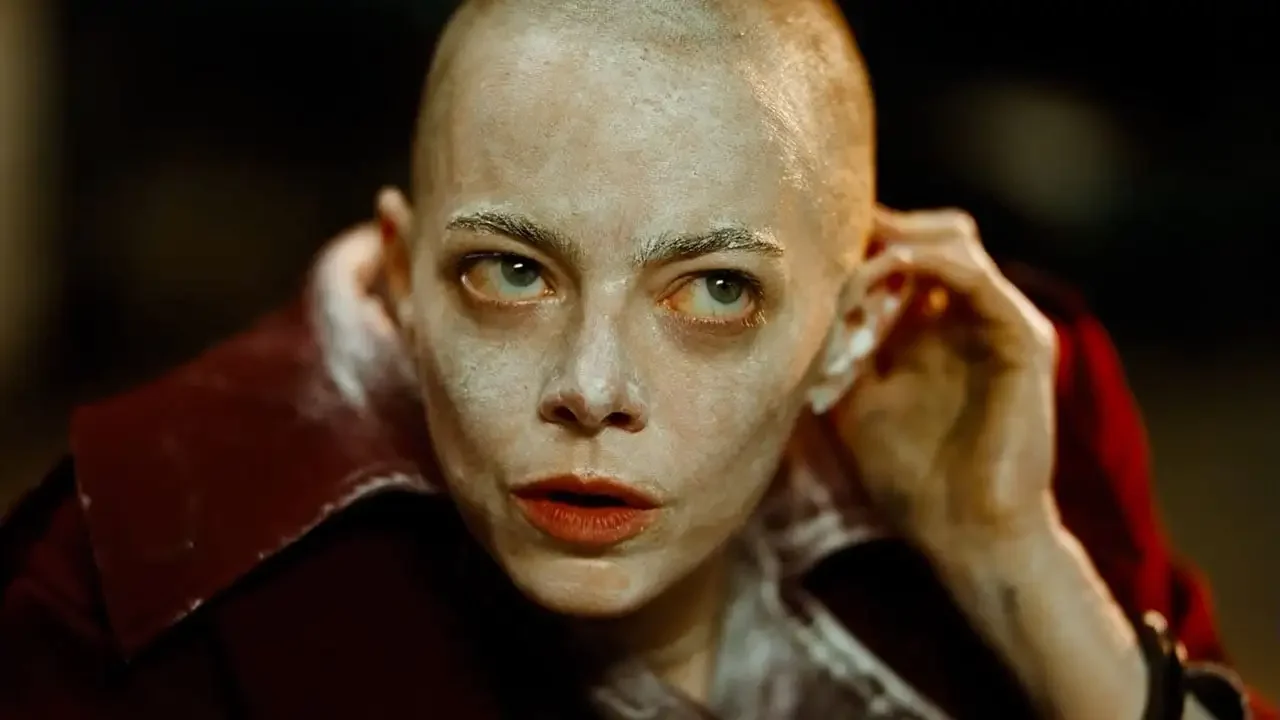Juice
(Ernest R. Dickerson, 1992)
⭐️⭐️⭐️⭐️
What would you do if the world didn’t care about you, and you didn’t care about yourself? What would you do if you’re so desperate for respect in a world that has no intention of ever respecting you simply because of the environment that produced you? One might feel like they have nothing to lose and decide to burn everything around them just to get a fleeting moment of respect, albeit a moment produced by fear and terror. These questions are at the crux of “Juice”, the 1992 urban thriller from Ernest R. Dickerson, and they apply to the film’s chief antagonist, Bishop (Tupac Shakur). “Juice” looks at how an unforgiving world can produce someone, Bishop, who is willing to tear down everyone around him just to feel like they are on top.
“Juice” is both a thriller where Shakur’s turn as Bishop drives the suspense and a character study of four youths living in Harlem. It is this character study that opens the film as we get introduced not only to Bishop but his friends Qunicy/Q (Omar Epps), Raheem (Khalil Kain), and “Steel” (Jermaine Hopkins). These teenagers live in Harlem and and fill their days by skipping school, hanging at a local arcade or Steel’s apartment, and running from the likes of the local police or a rival gang of youths led by the menacing Radames (Vincent Laresca). “Juice” smartly opens showing each character at home in a family setting. These characters are not from broken homes, but it is quickly clear they only rely on each other, especially while trying to navigate their rough Harlem neighborhood, desperate to get respectability from everyone else trying to make their way through life.
The film spends the first act letting the audience get to know each of these characters. Q is an aspiring DJ with his eyes set on an upcoming competition that will put some fame and respect on his name. Even though he shoplifts records and has an ongoing relationship with an older woman, Q sees he has some avenue to get something out of life. It is more than what his friends strive for and see in their futures. Raheem, seemingly the group’s leader, carries a cocksure swagger within the group, but he struggles to even get the respect of the mother of his child. Steel is the member of the group that everyone else rags on but keeps around just because he is one of them. Then there is Bishop, who is the group’s hothead and the one longing to be feared on the streets of Harlem. These personalities clash with normal teenage attitudes against an incredibly realistic and naturally shot Harlem. Their world is one that does not feel fabricated for Hollywood. Dickerson’s on-location settings in Harlem gives the film a harsh authenticity that helps further establish these characters and their motivations.
Things get amplified to a dangerous and tragic result once the group secures a handgun and plans a robbery of a local convenience store. Bishop fatally shoots the store owner and begins to spiral, putting the rest of the group in peril and sending the film into the territory of a pure thriller. Every time Bishop appears in the second or third act of the film, a sense of dread and apprehension forms. What danger will Bishop bring to those around him? What self-destructive actions will this character take because the world has always been destructive towards him?
Shakur’s performance as Bishop, his first real acting role, is nothing short of fantastic. He brings such an authenticity to Bishop externally and internally. Shakur gives Bishop a swagger on the streets of Harlem but also a sense of helplessness when he finds himself unarmed and in the company of a rival gang. This is a character that knows he cannot be tough or even be perceived to be tough without a gun in his hand. When armed, Bishop is a terrifying presence, one who appears out of the shadows to bring nothing but trouble and turmoil or give incredibly false sympathies at a funeral that he caused. Bishop is also a character that is far smarter than his surroundings would suggest, but his intelligence is one awash in a fatalistic cynicism. Bishop knows he has no chance of getting out of Harlem, and this drives all of his actions. His internal strife is driven by the nearly unspoken backstory of his ex-convict father, someone who bares mental and unseen physical scares from a life behind bars. Bishop does not want to end up like his father, and that knowledge combined with his surroundings will most likely mean a fatal ending sooner rather than later. This drives his actions and drives a descent into madness.
Bishop’s descent into madness is contrasted with Q’s struggle over what his life is becoming thanks to the actions of his friends. The DJ gig brings him success, and a better life could result if he keeps following this path. His friends, especially Bishop, are a deadly anchor keeping him weighed down in misery. Epps in his first film role is just as good expressing this guilt, this frustration, and this conflict as Shakur is in showing his confidence, intelligence, and unhinged nature as Bishop. Q knows he will end up on the wrong side of a gun sooner rather than later if he keeps running with Bishop, but he also knows avoiding him is out of the question. Q must confront Bishop and confront a lifetime of friendship in the process.
Buoyed by two dynamic debut performances and a gritty realistic setting, Dickerson makes “Juice” a memorable experience and one that will linger with the viewer long after the credits have rolled. The magnetism of Bishop is hard to avoid even though you fear every time he appears on the screen once the plot really kicks into motion. The struggles of Q to do right will resonate at the same time. “Juice” is a story set in Harlem of the early 1990s, but its themes of friendship, toxic masculinity, and trying to rise above your circumstances and situations continue to resonate decades after its release.
This review is part of my From the Vault series showcasing movies of the past I have decided to visit or revisit and review.





A layered performance from Brendan Fraser makes “Rental Family” a must-watch for anyone yearning and desperate to feel something.